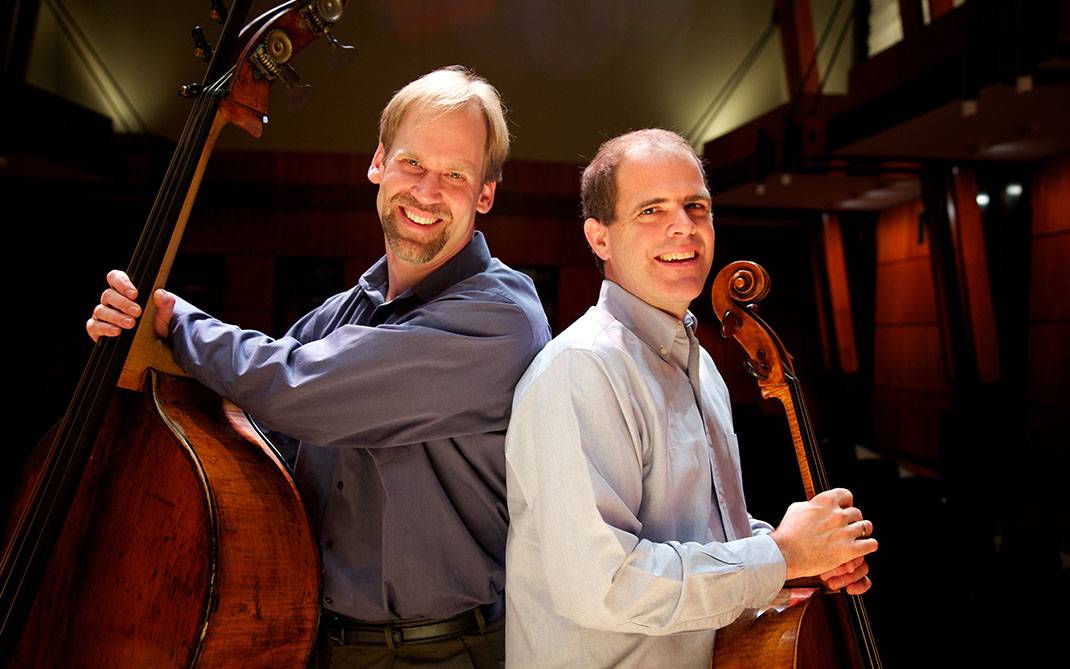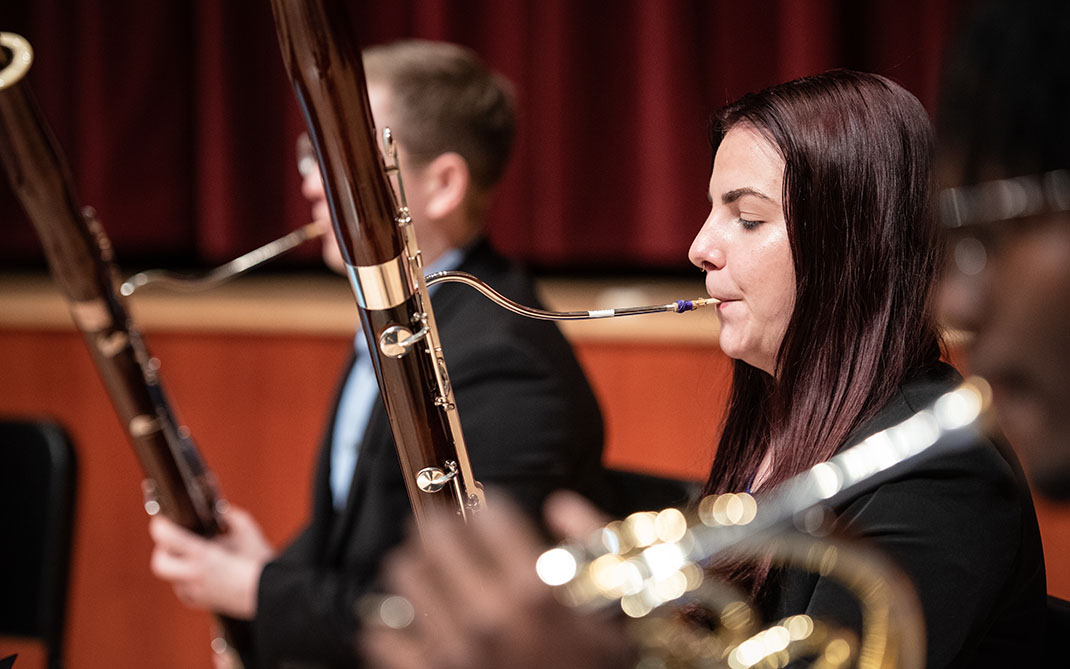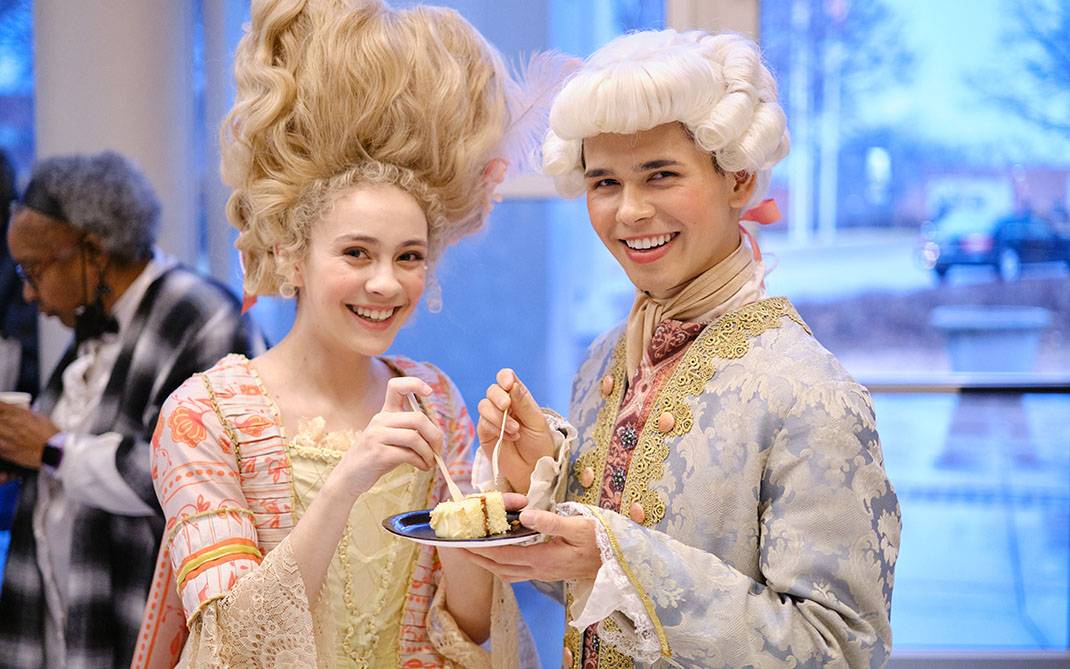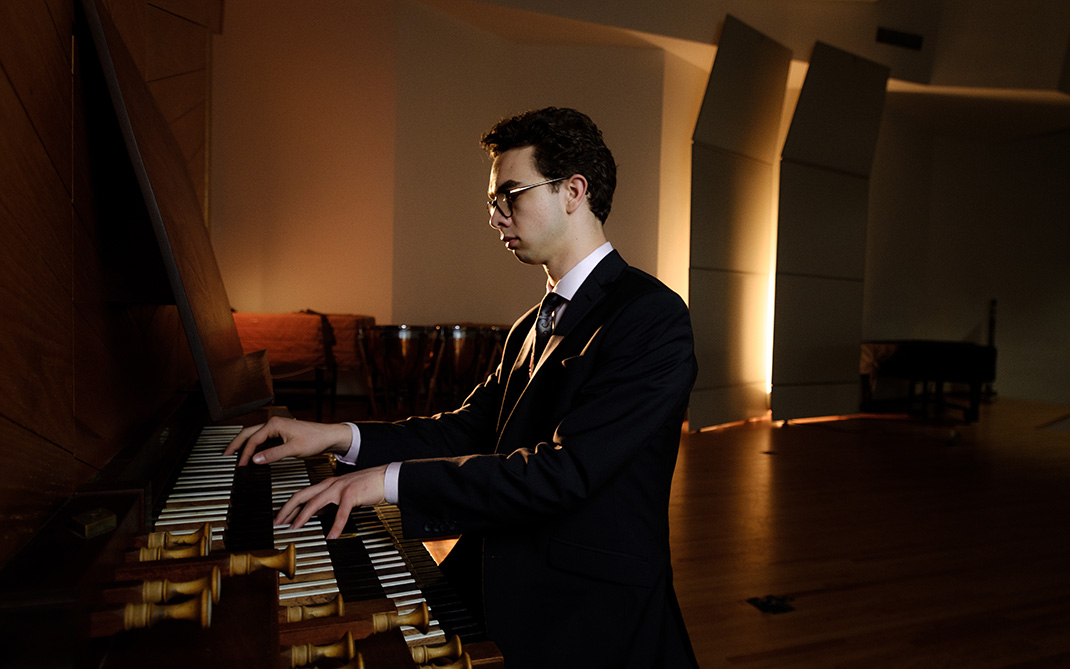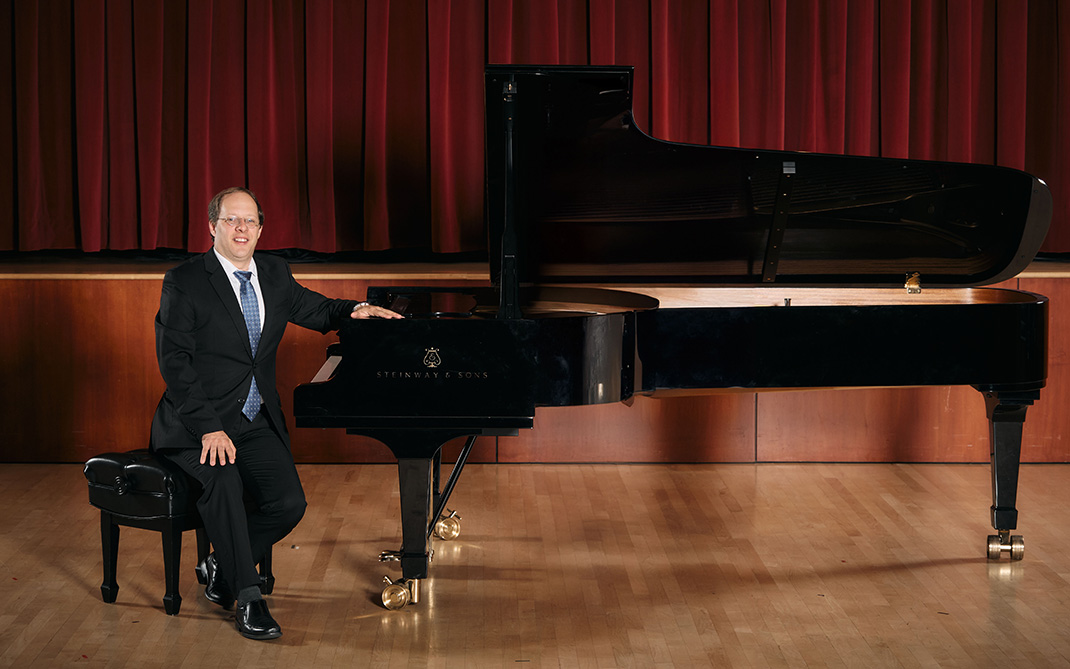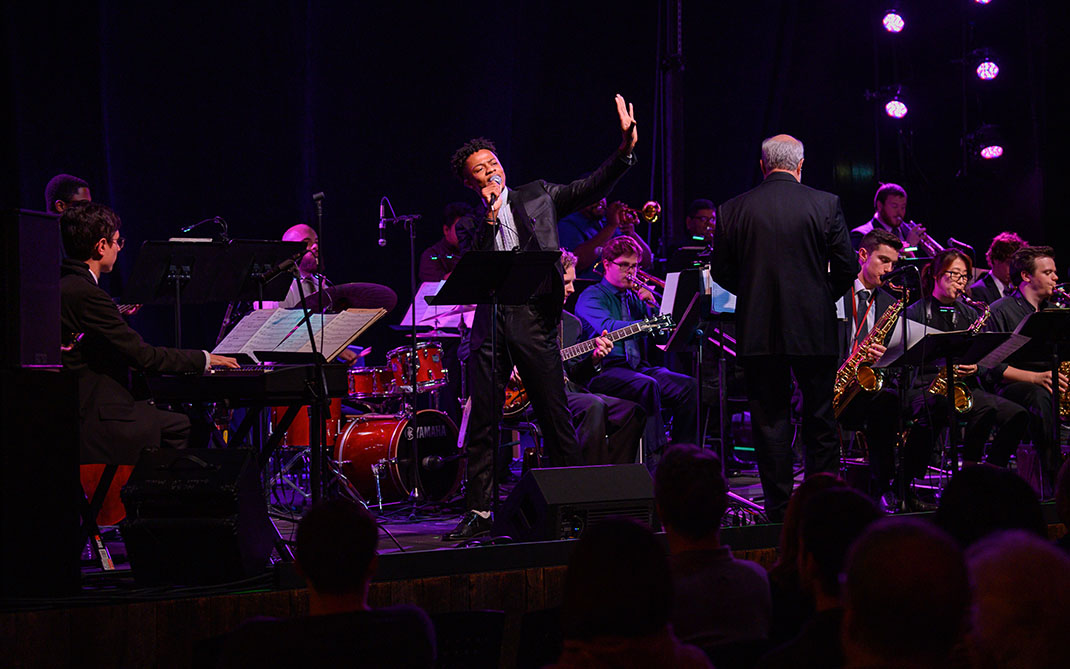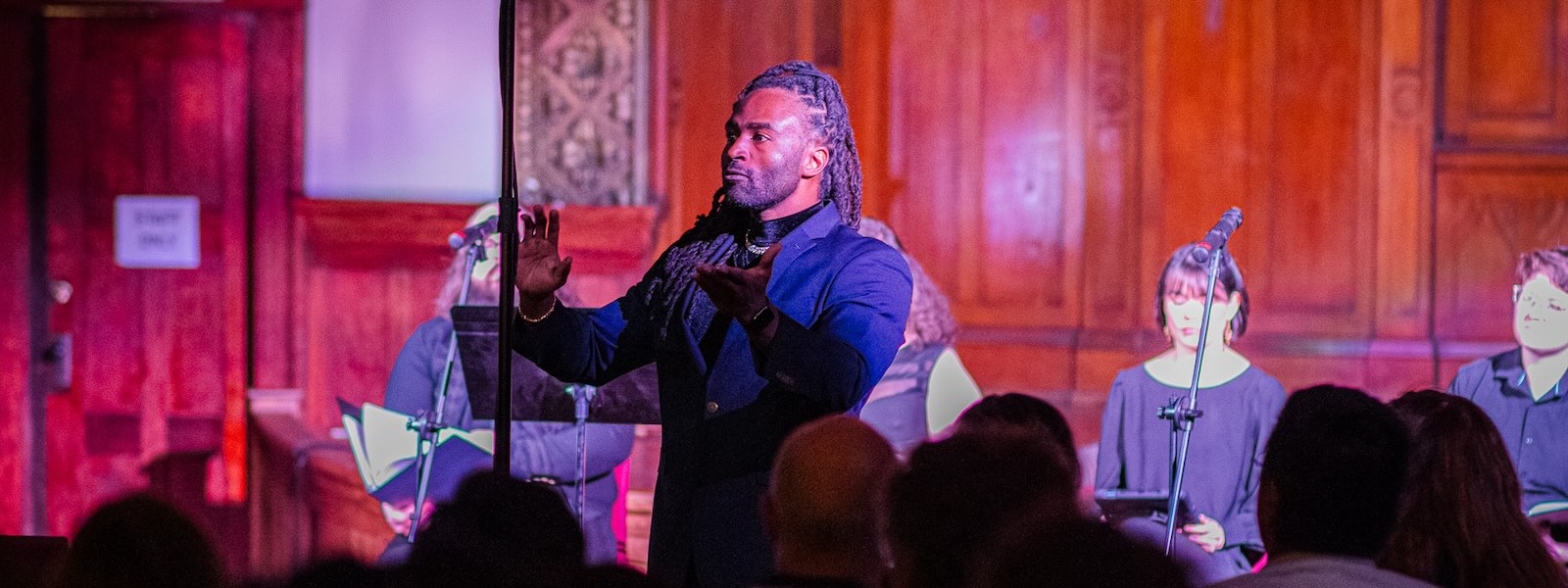Alexander Lloyd Blake
Listen to the interview on Apple, Spotify, or your listening platform of choice. Captioned interviews are available on YouTube.
The views and opinions expressed by speakers and presenters in connection with Art Restart are their own, and not an endorsement by the Thomas S. Kenan Institute for the Arts and the UNC School of the Arts. This interview has been edited for length and clarity.
In 2016, while earning his doctorate in music at the University of Southern California, Alexander Lloyd Blake founded the choral group Tonality. His initial aim was to create a choral ensemble that would represent and celebrate the full diversity of Los Angeles’ population. That done, Tonality started to focus each concert on social-justice issues, from global warming to gun violence, always providing audiences with an array of resources to encourage activism and change.
Tonality’s repertoire is as varied as its membership, ranging from Gregorian chant to contemporary pieces in a variety of styles and genres, but Alex’s commitment to harnessing the power of choral music to foment social change has remained central. In just eight years, Tonality has garnered nationwide attention. In 2020 Tonality received the Chorus America/ASCAP Award for Adventurous Programming, and in 2022 Alex and Tonality’s work were featured on “The Kelly Clarkson Show.” They’ve released two albums, and just this past spring, Tonality won its first Grammy for performing on composer Carla Patullo’s album “So She Howls.”
The ensemble has collaborated with a number of world-renowned composers, including Reena Esmail and Michael Giacchino, and has performed with such artists as Pete Townsend, Lara Downes and Björk. They have also sung for TV and film soundtracks, including “Space Jam: A New Legacy.”
Here Alex explains what led him to found Tonality and details the intricacies of leading a choral ensemble that has to remain increasingly nimble and focused.
Choose a question below to begin exploring the interview:
- You’ve said that you wanted Tonality to be about intentional respect … coming up as an artist, you probably experienced disrespect, whether intentional or unintentional. Could you talk about that?
- How do you center intentional respect in your leadership and choral-directing style?
- Can you talk about a moment when you thought you knew it all but you had to, in fact, be educated on a piece you were going to sing?
- Do you have the same kind of conversations with Tonality’s membership?
- Your membership reflects the diversity of the many cultures that live in Los Angeles, so there must be a multiplicity of opinions. Have there ever been times when there have been disagreements?
- You stated earlier that your audiences certainly at home tend to be more liberal … do you have any plans or thoughts about reaching those people who would have an opposing viewpoint?
- What was the toughest lesson along the way? Did you make any mistakes along the way that you’d be willing to share?
- Can you talk about a current or upcoming personal artistic project that you’re most looking forward to, whether it’s with Tonality or not?
Pier Carlo Talenti: In an interview I read, you said that you wanted Tonality to be about intentional respect, which made me think that, coming up as an artist, you probably experienced disrespect, whether intentional or unintentional. Could you talk about that? What did that disrespect look and feel like?
Alexander Lloyd Blake: Sure. I started singing gospel music. That’s how I got into the art of choral singing, singing in church. When I joined choirs in middle school and then just kept going, specifically classical choirs, I recognized sometimes the music that I would know, that I would recognize from my church experiences, was performed but it was treated differently, guesstimated in terms of the style or the performance practice. The more I studied classical music and the more I learned about how we revered some of these composers, it was just very evident that if the composers were mentioned at all — when it came to any type of gospel or African American spirituals or anything like that — it just seemed like a very easy, laissez-faire kind of situation.
The more I studied, the more I realized it wasn’t just music of Black cultures but really non-Western European music that was treated in this way in a number of instances. Of course, I would assume most of this is indirect, but a lot of us find some cultural ties or connections to music. When you start to feel like there’s a system in place that values certain music over others, I think the cultures from which that music comes also start to feel a little devalued. I thought it would be a worthy experiment to try to put together some type of choir where no one has to feel like that.
The way that I had studied classical music could be the way that we go about studying and performing and respecting all types of music and therefore the people who are represented by that music.
Pier Carlo: You have a master’s and a doctorate in music?
Alexander: Yes.
Pier Carlo: The roots of American music are in gospel, and American classical music is jazz, which has its roots in Black music. But you felt that even in a doctoral setting, that genre was not valued as much as that of the Western classical canon?
Alexander: I don’t know if as my awareness of those issues heightened, the incidences heightened, or if it was always like that and then I started to put words to the feelings I had felt. I don’t know which one. But I certainly can name a great number of instances where that happened in grad school. So yes, maybe things are changing now, but I don’t think at the time that was something that was at the top of mind of the system that I went under.
Pier Carlo: I’m sure the intentional respect in Tonality has an impact on what you choose to sing, but I wonder if you can talk about how you center intentional respect in your leadership and choral-directing style.
Alexander: I think really it’s about collaboration. I think it’s first about the awareness and then also releasing the responsibility to know it all. I grew up with the culture I grew up with. I grew up speaking English. Some other languages I’ve tried to work on, but I know what I know, and I can learn and have learned different styles.
But if we can work with different artists who can come in or who are in the choir and they can really help to home in on some of those nuances that you can’t even find in the written music, I find that that is a benefit to everyone in the room as opposed to people having to sit through someone ... I mean, the best mid-scenario, someone who’s worked really hard but doesn’t know the inner workings of a particular style. Or what I’ve had to endure — I think a lot of people have — someone who has not done much work, any work, and who will just create some kind of caricature of something they might have heard.
For us and for me, it’s really just when we choose pieces, if there are pieces in different styles … that’s a benefit of being in L.A., I guess. But yeah, working with people, asking questions. Even now, if people don’t live with us, there’s Zoom. There are ways of getting in touch with different practitioners who can really help us as experts in those different cultural genres.
Pier Carlo: Can you talk about a moment when you thought you knew it all but you had to, in fact, be educated on a piece you were going to sing?
Alexander: Luckily, I don’t know if there have been many instances where ... because that’s how Tonality started, asking people to come in. But I will say there was a whole concert theme that I had to be educated on.
Pier Carlo: Oh, what was that?
Alexander: The 2017-2018 season was when we started to do our social-justice concerts. I just chose three subjects, and one of those subjects was women’s rights. That was just on the top of mind. We had decided that subject right before the #MeToo movement really took a national stage. We had decided the theme, but we had not created a concert. I thought, “What a timely place to do a #MeToo concert, to really talk about domestic violence and all these things.” Then I remember thinking, “How many concerts have you been in about Black music, Black History Month, and it was obscenely clear that no one had asked anyone from that culture?” And so I said, “Maybe I should not try to create this thing by myself,” and so I asked some singers, some composers we had worked with, some board members and a co-conductor to meet with me and talk.
We all sat in this room, and I said, “I have this great idea. We’re going to do a #MeToo concert. It’s really going to talk about the experiences of women, and it’s going to be really powerful.” The women in the room said: “Women’s assault, those are not women’s issues. Those are men’s issues that women have to deal with. If you want to talk about women’s rights, women’s power, talk about women’s voices. You can talk about the silencing of women’s voices and the strength of voices, which would include what women have to endure but it would not create a whole concert around men’s issues.”
So that’s what we did. It was beautiful to have female audience members come up to me and say, “Thank you so much. This is not what I was expecting, and it felt really affirming to be here.” I thought, what is lost by asking those questions? Because we could have done another concert, and I’m sure some people would’ve found that powerful, but I think certainly the perspective that should have been centered would have been missed.
Pier Carlo: And all it took was one important meeting.
Alexander: Right. Because I think people want to help, but it’s really us as leaders getting out of our own way. And if I may be so bold, I feel like educational systems, ironically there is no more dangerous place to not know something. I feel like we are not really taught that it’s OK not to know. You don’t have to have all the answers.
Pier Carlo: Because you also teach high schoolers. Do you teach them that lesson as well?
Alexander: Absolutely. I will bring some of the music that we’ve done in Tonality. I don’t teach anymore at LACHSA [Los Angeles County High School for the Arts], unfortunately. I loved the students. But when I was teaching, we would do some Tonality concerts or the songs from those concerts, and we would sit and just talk. I would ask questions and let them talk. It was really more guiding them talking than me talking at them about the subject matter.
I always tell people, “If you ever have any kind of doubt that young people are not on top of what’s going on and don’t have really smart, insightful ways of thinking about some of these very difficult issues, you should just go to a class, or you should just create an environment to hear them speak.” There’s of course guidance and there’s lessons in listening that I can help guide in the room as they’re working through these things, but they are talking very intelligently, in my opinion, about what’s going on.
Pier Carlo: Do you have the same kind of conversations with Tonality’s membership?
Alexander: It’s a required part of every concert.
Pier Carlo: Oh, OK! Tell me more about that.
Alexander: It kind of came about accidentally. We were working on this piece, Norman Dinerstein’s “When David Heard,” a beautiful eight-part choral setting of “When David heard that Absalom was slain.” It’s difficult to tune. It is a long piece, longer than most of the choral works, I think, that a lot of choirs do. We just couldn’t tune it; it was not tuning well. This was a part of our gun-violence concert.
I remember we were going over the same part over and over, and someone just stopped the rehearsal and talked about how their best friend was killed by that friend’s ex-partner and how the parents were just screaming over the casket. In that choral work, there’s a moment where the sopranos scream a high B flat as the choir comes in under them. After that story, after that moment that we all just took to connect emotionally, we never had a problem tuning that piece. It gives me chills every time I think about that. And since, we have never had a problem tuning that piece.
I majored in music, but I love math, and I love the nuts and bolts of things. There is something that brought us together not just as better musicians but as better people and connected us to the emotional sharing of that, and it really taught me that you can’t do these concerts without the emotional safety and connectedness of the artists in the room.
And the storytelling. It really became and remains a central part of our concerts. Every rehearsal cycle we do, we always set aside a time for us just to talk about the issues. People tell stories, or we’ll learn, depending on the subject. And then we have people tell stories in the concert.
To me, it really feels like these concerts are avenues for people, singers, to vulnerably and bravely share their own experiences. Then we use the music to emotionally connect the audience to those stories. I think we’re creating conversations and creating new ways for people to understand issues that they might not have had as much intimate connection to.
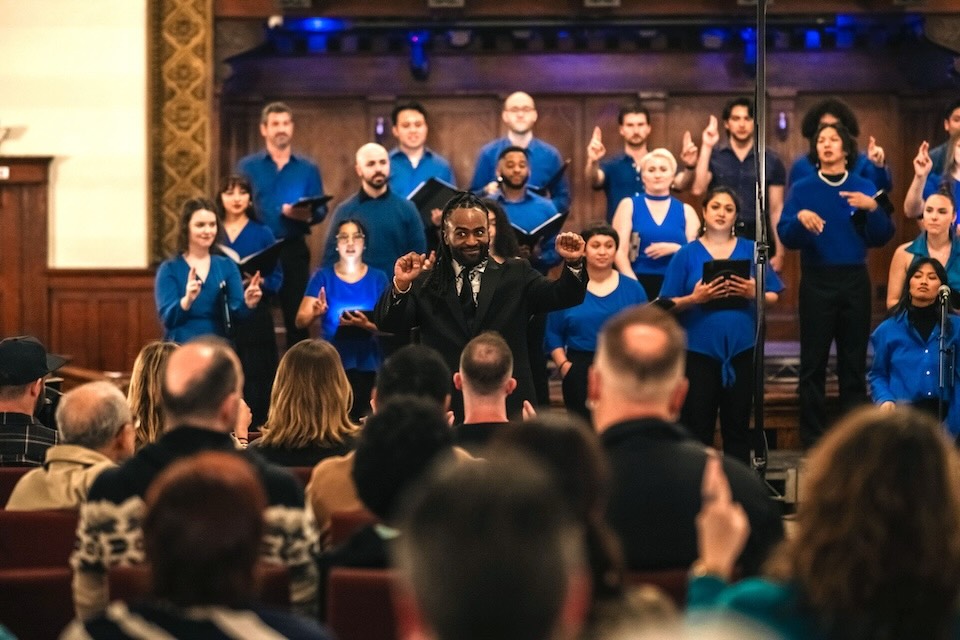
Tonality vocal ensemble led by Founder and Artistic Director Dr. Alexander Lloyd Blake.
Pier Carlo: You’re creating incredible intimacy within your ensemble, but also it must be a very powerful experience for your audience to feel invited that deeply into your chorus members’ experiences.
Alexander: Yes, we’ve heard from audience members … . I think we sing generally for more liberal-minded audience members. I think it’s one thing to intellectually think about some of these issues and to agree that these are things that we should think about and it’s another thing to actually hear someone talk about an issue that has affected them directly.
I use police brutality as an example. I think a lot of our audience members would say that police brutality is a problem or would say that homelessness is a problem, but I don’t know if a lot of our audience have had incidents where they have had to deal with that directly or have had a family member who has dealt with that directly. To hear someone speak about a nephew, a brother, a cousin they loved, speak about all the experiences, the happy, joyous experiences they’ve had with someone, the humanity of someone who was taken away in this way … .
Or a situation where someone was mentally ill and lost their housing, to hear about those things from a singer who steps out of this performer role and just becomes a person, it creates, I think, the emotional connection to these issues. Then it no longer becomes like, “Oh, I’m sitting over here and I’m listening to this issue that you all need to talk about and we need to work on.” It becomes our issue. You are watching someone emotionally tell this story. You become emotional with them. And now we have created a community, and how do we solve the problems of our community rather than how do we solve someone else’s issues?
Pier Carlo: And I loved hearing what you said, which was it also creates for better musicianship.
Alexander: Yes.
Pier Carlo: Your membership reflects the diversity of the many cultures that live in Los Angeles, so there must be a multiplicity of opinions. Have there ever been times when there have been disagreements?
Alexander: Yes. And there have been times that I’ve been questioned about music. The point is not for us all to agree. I think it’s just for us to understand our perspective or perspectives that are possible. For the work we do, when we have those types of disagreements, making sure people are heard is the big part.
I remember we did a concert on climate change, and there was a very intense talk about the vegan lifestyle. There was a very clear opinion about how being vegan is one of the best ways to decrease your carbon footprint. And the talk really centered around that issue. The concert was about climate change, but we really stayed there for a while. The conversation was really then about how to allow that perspective to be presented in a way that did not turn people off but also didn’t shut any side down. In these concerts, in my opinion, you can present things to people, but to me these concerts are about sharing personal experiences more than telling people what to do.
Pier Carlo: You stated earlier that your audiences certainly at home tend to be more liberal, so in a way it’s a choir preaching to the choir. Other than appearances on a national show like “The Kelly Clarkson Show,” do you have any plans or thoughts about reaching those people who, just to start with, would have an opposing viewpoint?
Alexander: It’s so funny. I’ve been asked this so many times: “When are you going to go into the red states and do the hard work?” And I said, “Trust me, I’m doing the hard work.” Honestly, hm, finding a nice way of saying this. There is so much opportunity to create impact among people who generally believe the same thing we believe. I’m from North Carolina. I come from a small town. I’m from Jacksonville, a more conservative area, so I understand that sentiment, but since moving to L.A., I realize there’s a lot of work we can do.
There’s a big difference between mentally knowing something is wrong and actually doing something about it. I think asking people about homelessness, generally, you’re going to find this an issue. Of course, I’ve said this before the Supreme Court’s recent actions, but you ask people about homelessness and you say, “Should something be done? Should we help these people?” and of course the overwhelming answer is yes. I say, “Great. Name three organizations. Name one organization that’s doing this work?” And then no one has an answer. To me, it’s a big problem that everyone is talking about issues and that’s where it begins and ends. I feel like we have made intellectual arguments out of situations that affect people’s livelihoods.
Our concerts to me are not necessarily currently about trying to convince opposing mindsets of what we’re talking about. First, I think our work is to bring in people who agree with us and say, “Since you agree, let’s turn this from an intellectual stance to an emotional one. And then let’s bring in the organizations who are directly involved and then have you be a part of the solution and not just another voice screaming into the void or the echo chamber.”
Pier Carlo: So you’ve been leading the group now for eight years, I think?
Alexander: Yes.
Pier Carlo: What was the toughest lesson along the way? Did you make any mistakes along the way that you’d be willing to share?
Alexander: Sure! I think the group grew a lot after the pandemic. The opportunities grew, the calls. We were no longer just producing concerts in churches. We were singing with Björk, we were singing with Kelly Clarkson. We were singing on the score of “Space Jam 2.” The organization grew so quickly, and of course, I’m receiving all the emails. I’m in it. I’m seeing it change as it goes. I think one of the things I had to learn was, even as the group grows, it can’t grow any sooner or any quicker than the mentality of everyone involved.
We went from a group of … we were working with the same 24 people to now we have a roster of 70 to 90 singers.
Pier Carlo: Who can rotate in and out?
Alexander: Yes, because everyone is busy. We were calling the same 24, but we were never getting the same 24. We had to switch to a model where we now have a roster of singers from which we call for all concerts. It’s like a more contractual thing as opposed to you’re going to see the same singers, because it’s impossible. There are just too many choirs, too many amazing opportunities. We can’t lock singers down because we can’t pay to lock singers down. It’s a huge mentality shift.
I think being in on this side, I was, “Oh, well, people will understand. People are saying no to us all the time.” But of course, if you are one person, you only have your experience. I think that was something that I overlooked as the organization grew. We just didn’t have the infrastructure to really sit, or I should say we did not sit and really make sure that everyone understood the changes. I think I was so busy doing and in the growth that I didn’t think, “Oh, it’s actually really important to bring people along with that understanding.”
Pier Carlo: You made a lot of changes without communicating with the membership. Is that what you’re saying?
Alexander: Or taking time to really make sure. I think there were communications, but they were not thorough, and there wasn’t really time to really make sure that people understood. It was like, “OK, this is a change,” not, “This is why the changes are happening.”
Pier Carlo: You do so much. Not only are you Tonality’s artistic director and conductor, but you also perform, and you arrange. I wonder if you can talk about a current or upcoming personal artistic project that you’re most looking forward to, whether it’s with Tonality or not.
Alexander: Sure. I need to find a better way of talking about it because it scares me. I applied for a grant to write a piece. I was talking to one of our board members, one of my friends, Joe Trapanese, who is a film composer, about “Considering Matthew Shepard.” I was like, “There should be more pieces like this, and I think it’d be great if we started talking about different people, different experiences.”
I had mentioned Ahmaud Arbery because I had done a project about Ahmaud with a friend, Danielle Withers. We put together this project during the pandemic. We were already working on this in relative silence about police-brutality things when George Floyd was murdered. Which was really bizarre. I think the whole world turned their eye to George Floyd, but Ahmaud Arbery happened a couple of weeks before.
I still remember thinking, “I don’t really feel like that story got its time.” There was so much in it, and I felt like someone should write about it. Joe said, “Well, you should do that. You’re a composer.” I was like, “Hm, I’m an arranger. I take melodies that have already been written, and I like to do fun things with them, but I’ve never considered myself a composer.” But he told me, “Maybe think about it.”
There were some grants that came about. We applied, and I assumed that they were going to work with seasoned composers. We applied for two opportunities, the Copland Fund and the MAP Fund. We received both of them on this idea that I would write this piece, and I thought, “Oh wow. OK!” So that’s what I’m working on.
The piece is called “Running From, Running To.” It’s a piece that really speaks about, using many themes, running. It’s about the whole perspective around — or at least my reflection around that story — how Ahmaud was running when he had the incident with those three vigilantes, three murderers, how Black men continue to have to run from police, from these systems that have never really seen us as fully human, how we as a society run from ugly things, but how eventually we all start to move toward collective understanding. This piece is going to be premiered in May 2025.
Pier Carlo: Do you know where it’s going to be premiered yet?
Alexander: Yes. It’ll be premiered at the Wallis Annenberg Center for the Performing Arts in Beverly Hills. We will start singing there. It’ll be a big premiere, which is all slightly intimidating. But I luckily have received a lot of insight and it’s such a big story —
Pier Carlo: And it will be Tonality performing it?
Alexander: It will be Tonality performing it.
Pier Carlo: I see. And when you said “we,” are you collaborating with someone on the composition?
Alexander: I have started to work with people just to get ideas, still figuring out what all that looks like. Like I said, it’s a multi-movement piece. I’ve done four-minute arrangements, so to have to do a piece for half an hour with some orchestral setting … .
I have an arranging minor for the doctorate study. It’s all within my ability, but it’s just a huge stretch of something that I’ve had to do. But I keep telling myself I’m not telling Ahmaud’s story. It’s been told. I’m just sharing my reflection of it. I think the more I lean into that, this is an opportunity to give voice, to give another perspective and another way of thinking and hearing about such an important story that we are all involved in. Yeah, it certainly feels like a colossal undertaking, but it also feels like a very special opportunity that I’m honored to be able to do.
August 26, 2024
